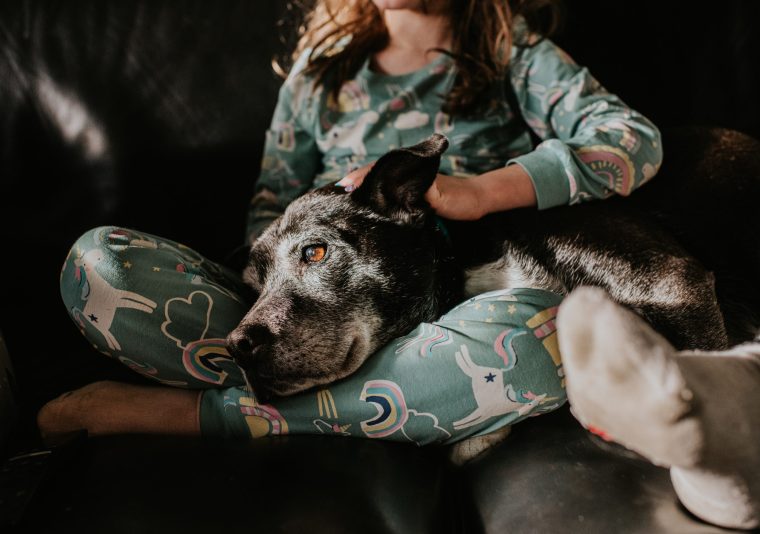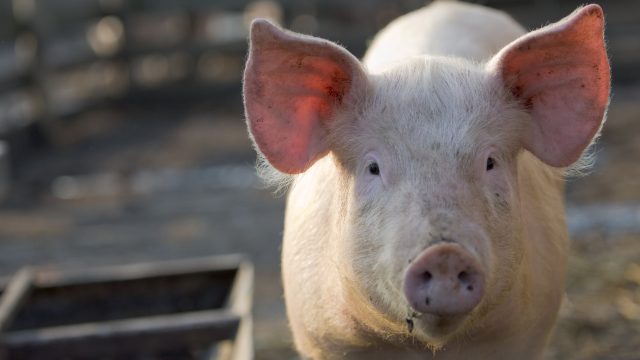
D.C. Pets in Housing Act Aims to Remove Barriers to Housing for Multispecies Families
By Nicole Pallotta, PhD, Senior Policy Program Manager
Contents
Summary
Summary: Effective October 2025, the D.C. Pets in Housing Amendment Act restricts “pet fees” and bans breed and size discrimination in pet-friendly rentals, supporting the policy goal of keeping companion animals with their families, regardless of socioeconomic status. This law is part of a nationwide trend to remove barriers to housing for the large portion of the population who are both renters and guardians of companion animals. Also discussed are related developments in other states, the goal of pet-inclusivity, areas for future improvement, and the importance of treating animals as individuals—which supports housing equity and reinforces that animals are fundamentally different from other types of property.
When we reduce housing barriers to pets, we reduce discrimination and displacement for people. While legislation keeping people with their pets may seem lighthearted, the impact is anything but: we’ll have fewer people turned away from housing, fewer unhoused residents sleeping outside out of fear of being separated from a pet, and more domestic violence survivors seeking safety.1
— D.C. Councilmember Robert White
On December 17, 2024, the Council of the District of Columbia unanimously passed the Pets in Housing Amendment Act of 2024, also known as “Roscoe’s Law” in honor of bill sponsor Councilmember Robert White’s late rescue dog. The law marks an important advancement for multispecies families, aiming to increase access to affordable housing by restricting “pet fees” and banning breed and size discrimination in pet-friendly rentals. It also ensures that at least one D.C.-area shelter will allow unhoused residents to stay with their companion animal.2
Providing much-needed reform to inequitable housing policies that disproportionately affect lower-income residents, this law supports the policy goal of keeping companion animals with their families, regardless of socioeconomic status. While the new law applies only to D.C., the pet-restrictive policies it targets are ubiquitous across the U.S.
What the Law Does
Effective October 2025, housing providers in D.C. are limited in how much they can charge for deposits and fees related to living with a companion animal. Pet security deposits are capped at 15% of monthly rent, and may be withheld only for damages directly caused by the animal, and so-called “pet rent” is capped at 1%.
Additionally, as of October 2026, housing providers that allow companion animals may no longer impose restrictions or differential fees based on breed, size, or weight. By this date, the D.C. Department of Human Services must also ensure that “at least one low-barrier shelter has space available for residents who are homeless and accompanied by a common household pet.”3
Upon introducing this bill in December 2024, Councilmember Robert White said:
As I work to ensure that all DC residents have access to affordable housing, I put forward this bill to remove the real and persistent barriers that people face—especially those who have pets and are struggling with housing insecurity. This bill ensures that residents with pets, who are family, can secure and keep a stable, affordable home.
The Animal Legal Defense Fund testified in support of this bill and was part of the People + Paws Coalition for Affordable Housing, an alliance of policy and legal advocacy organizations that worked to pass this legislation. Law students were also integral to its passage and were involved in advocacy efforts through the GW Law Animal Welfare Project, which developed the bill in partnership with D.C.’s Humane Rescue Alliance.

Equitable Policies and Housing Justice
The D.C. Pets in Housing Amendment Act is part of a nationwide trend to remove barriers to housing for the large portion of the population who are both renters and guardians of companion animals. However, this law does not ban blanket “no pets” policies in housing—it only applies to properties that are already pet-friendly. Thus, landlords may choose to no longer allow companion animals rather than adopt the new policies.
Opponents of the legislation raised a concern that a potential unintended consequence of this law could be an overall reduction in the number of pet-friendly housing options. However, the People + Paws Coalition for Affordable Housing testified that this negative effect was not seen after related legislation was enacted in Colorado in 2023:
The threat or fear that this type of legislation will greatly reduce the number of pet-friendly rental units ultimately did not bear out in Colorado after a pet rent and deposit cap went into effect. With two-thirds of U.S. households owning a pet, making rental units less pet-inclusive would not be a financially sound business decision.4
While Colorado’s law capped pet fees, it did not ban breed or size restrictions. The impact of D.C.’s more comprehensive law on the number of pet-friendly rentals remains to be seen, but its policy goals are sound. Even if a reduction in pet-friendly units were to occur due to this law (versus unrelated factors affecting the rental market), additional solutions exist to achieve the goals of improving access to stable and affordable housing, supporting multispecies families, and keeping companion animals out of overburdened shelter facilities.
One such solution is to prohibit blanket “no pets” policies in all rental housing. Such legislation would not prevent landlords from setting reasonable requirements for tenants with animals, and they would retain the ability to evict a tenant for violations thereof. Setting non-arbitrary rules that apply to all tenants is an equitable way to address anticipated problems with broadening access for companion animals in rental housing.
What is a Family?
Curtailing landlord discretion to impose sweeping bans on certain types of tenants has policy precedent in adjacent social contexts. For example, the current legal protections that exist for renters with children have only been in place since 1988, when the Fair Housing Act (FHA) of 1968 was amended to include familial status. Before these amendments, landlords had discretion to set “no children” policies and to restrict the ages and number of children allowed in rental units, which eventually came to be understood as unfair and discriminatory.5
The Center for Youth Law, which advocated for making familial status a protected class under the FHA, explained why this reform was necessary:
By the 1980s, housing discrimination against families with children was a growing problem throughout the country. A widely cited 1980 survey by the U.S. Department of Housing and Urban Development (“HUD”) showed that 25% of rental units excluded children outright. An additional 50% of rental units had restrictions on the age, number, or sex of children in tenants’ families. The survey found that half of all rental units were unavailable to a family with two children.
These data echo current discourse about animal-exclusionary policies in housing, and raise a timely question: are companion animals family? Serious consideration of this question can sidestep animals’ current legal status as property, as family member and property need not be mutually exclusive categories. For example, historians have noted that in many early legal systems children were considered property of their fathers. Eventually, modern custody law evolved alongside women’s rights to focus on the best interests of the child.6
While the U.S. legal system is ambiguous about animals possessing the dual status of property and family member, this area of law is also evolving. The space where family law and animal law intersect—what we might call multispecies family law—has seen advances in the areas of custody, domestic violence protective orders, and co-sheltering, among others. Outside the U.S., some important rulings in Latin America have made further strides toward codifying companion animals as family.7

Toward the Goal of “Pet-Inclusivity”
Permitting tenants to have an animal companion is an important first step. Equally important is eliminating exclusionary breed and size restrictions. Many properties that advertise as “pet friendly” in fact exclude a large percentage of dogs due to such policies. “Pet inclusive”—permitting companion animals without arbitrary restrictions on breed or size, and without added fees—is the better goal.
Demonstrating the gap between pet-friendly and pet-inclusive housing, the Michelson Found Animals Foundation presented the data below in support of the D.C. Pets in Housing Amendment Act:
The challenge comes into stark relief when comparing the 72% of residents who say pet-friendly housing is hard to find to the 76% of rental property owners/operators who say their properties are pet-friendly. This fundamental disconnect is evidence that being ‘pet-friendly’ while only permitting certain pets is not enough. This legislation moves beyond pet-friendly to what pet owners are looking for in rental housing– pet inclusiveness. In DC, this disconnect is borne out in data collected through Smart Apartment Data showing that about 80% of rental units are ‘pet-friendly,’ meaning, simply, that they allow pets, while only about 6% of rental units are without breed or weight restriction.8
Pet-restrictive housing policies negatively affect people and animals. They also burden communities and animal shelter facilities when residents abandon or relinquish their animals because they cannot secure housing. Housing options are already limited for prospective tenants with companion animals, and properties that do allow them often charge extra fees or exclude the majority of dogs who are over 25 lbs. (a common weight restriction in pet-friendly housing).
In 2023, Florida enacted legislation to remedy this problem in public housing by prohibiting breed and size restrictions in that sector. While federal law directs public housing authorities to allow residents to have at least one “common household pet,” they are allowed to set reasonable requirements. Commonly, this results in policies that restrict a majority of companion animals.
For example, some housing policies only allow dogs who weigh 20 pounds or less. In contrast, survey data show that for households that include dogs, 47% are small dogs (defined as under 25 lbs.), 31% are medium (25-40 lbs.) and 36% are large (over 40 lbs.).9 Earlier data from the same survey showed 85% of respondents consider their companion animal to be family.
These data reveal a clear disconnect, with definitions of “pet” in so-called pet-friendly housing excluding the majority of family dogs—67% according to this survey. Policies often restrict the number of animals to one as well.
Such exclusionary policies unfairly burden residents with fewer socioeconomic resources, who may feel forced to choose between securing affordable housing and keeping their animal. Shelter statistics bear this out: housing issues are among the top reasons dogs are relinquished to shelters, and the number one reason large dogs are surrendered.10 Additionally, large dogs are at a higher risk of being killed in shelter facilities—in part because exclusionary housing policies reduce the pool of potential adopters.11
In D.C. alone, the Humane Rescue Alliance—the District’s primary animal shelter facility—observed that “over the past five years 1,902 animals have been relinquished to HRA because of landlord restrictions and/or housing issues.”12
In contrast, pet-inclusive housing allows multispecies families to stay together and supports adoption of companion animals from overcrowded shelter facilities, which are facing a years-long capacity crisis across the U.S. Some studies suggest that tenants with companion animals stay longer and that offering pet-friendly rentals can be more profitable for landlords, so the impetus to provide pet-inclusive housing need not be purely altruistic.13
Public Versus Private Housing
As noted above, federal law in the U.S. permits tenants in public housing to have at least one “common household pet.” Although public housing authorities (PHAs) have “considerable discretion” to establish “reasonable” policies and restrictions on the types of animals allowed, such restrictions should be “drawn narrowly to achieve the PHA’s legitimate interests, without imposing unnecessary burdens and restrictions on pet owners and prospective pet owners.”14

Despite the ample discretion granted to PHAs, these requirements suggest that the federal government recognizes the outright exclusion of people with animal companions from housing is unreasonable. But these regulations do not apply to privately owned housing, thus for now leaving needed reforms in this area to the individual states.
While no state has yet enacted a law banning blanket “no pets” policies in private rentals, California considered a bill, AB 2216, that would have made it the first. This bill would have expanded the state’s existing law allowing public housing tenants to have at least one companion animal to apply to all rental housing providers.15 But it was withdrawn in July 2024 following strong opposition and persistent lobbying efforts from rental property associations and industry organizations.16
While such broad tenant protections may not on the immediate horizon for American renters, some jurisdictions outside the U.S. have enacted similar laws. For example, the Australian state of Victoria banned “no pets” policies in all rental housing in 2020. Tenants must obtain consent to have a companion animal, but landlords cannot refuse the request without a reasonable cause. Likewise, Ontario since 1997 has made “no pets” clauses in leases unenforceable.17 A landlord may refuse to rent to someone with a companion animal but cannot evict them for having an animal once they have signed a lease.
In all cases where blanket no “pets policies” have been prohibited—including those pertaining to public housing in the U.S.—tenants with companion animals can be evicted for non-arbitrary reasons related to individual behavior that violates established rules (e.g., regarding public safety, hygiene, or noise).
Related Developments
The D.C. Pets in Housing Amendment Act follows related developments in Florida and Colorado. As noted above, in 2023, Florida prohibited public housing policies that ban dogs based on breed or size, but this law does not apply to private landlords. That same year, Colorado limited the amount of fees landlords can charge tenants with companion animals, but did not address breed and size restrictions. The D.C. Pets in Housing Amendment Act combines elements from each of these laws, limiting pet fees and banning breed and size restrictions in rental housing that allows companion animals.
Although it does not address breed and size restrictions in rental housing, Colorado’s law contains other positive reforms. For example, it banned breed restrictions in homeowner and dwelling fire insurance (also known as “landlord insurance”). Earlier in 2023, Illinois’s Dog Breed Insurance Protection Act likewise prohibited breed discrimination in homeowner and renter insurance policies.
Importantly, both laws still allow insurance companies to restrict or cancel policies on the basis that an “individual” (Illinois) or “particular” (Colorado) dog is dangerous. However, this determination may be made only on the basis of a dog’s behavior, not their breed or mixture of breeds.
Florida’s law banning breed and size restrictions in public housing contains similar provisions. Dogs deemed dangerous may be restricted, but this determination, and any related requirements, must be based on an individual dog’s behavior.

Animals as Individuals
The trend toward focusing on individual dog behavior rather than breed, size, or other physical characteristics is a welcome policy shift. Laws that center specific behaviors not only reinforce that animals are fundamentally different from other types of property but also better serve public health and safety goals related to dog aggression. For example, recent research has shown that dog breed is generally a poor predictor of individual behavior.18
Treating companion animals as individuals also supports housing equity. Colorado’s law includes a legislative declaration that explains the urgent need for, and social benefits of, pet-inclusive affordable housing. Importantly, this declaration notes that relinquishing a companion animal due to housing barriers has a harmful impact not only on human family members but also on the well-being of the animal herself:
Frequent reasons for surrendering a pet include issues related to housing, moving, or landlords. Often, rehoming a pet is the last option for an individual or family and it has a detrimental impact on the physical and emotional well-being of the pet…. [emphasis added]
Legislative declarations create important context by stating the policy goals of the law itself. In this case, the recognition that animals suffer psychologically as well as physically—in this case when they are separated from their family—is significant.
While Colorado’s law stopped short of mandating pet-inclusive policies, the legislative declaration made clear it hoped housing operators will adopt these policies on their own, stating: “It is the intent of the general assembly to encourage housing developers, owners, landlords, insurers, and other operators to increase pet-inclusive affordable housing in Colorado.”
Conclusion
The D.C. Pets in Housing Amendment Act and related developments in other states are important advances for multispecies families who face inequitable housing polices related to companion animals. However, none of this type of legislation thus far applies to housing that is not already pet-friendly. This is a crucial area for future improvement. Pet-inclusive policies contribute to housing justice and animal protection by removing barriers to accessible housing, particularly for lower-income families, and helping keep companion animals out of overburdened shelter facilities.
Any opinions contained in this article are the personal views of the author. They are not necessarily representative of the opinions or views of the Animal Legal Defense Fund or any clients. This information is presented for informational purposes and does not constitute legal advice.
Further Reading
- Council of the District of Columbia. B25-0827 – Pets in Housing Amendment Act of 2024. L25-0308 Effective from Mar 21, 2025.
- Memorandum [includes background and need for bill and summary of witness testimony]. Robert C. White, Jr., Chair, Committee on Housing, Council of the District of Columbia. Report on B25-827, the “Pets in Housing Amendment Act of 2024.”
- National Low Income Housing Coalition. “Opportunity Starts at Home Campaign Releases New Fact Sheet on Companion Animal Welfare and Pet-Inclusive Affordable Housing.” March 17, 2025.
- Thibodeau, Wayne. [Canada] “Petition calls for federal ban on no-pet clauses in rental agreements.” August 9, 2024.
- “Pallotta, Nicole. “Florida Prohibits Public Housing Policies that Restrict Dogs Based on Breed, Size, or Weight.” Animal Law Update. Animal Legal Defense Fund. May 14, 2024.
References
- Councilmember Robert White Joins George Washington Law Students and Humane Rescue Alliance to Introduce Pets in Housing Act.
- This law amends the D.C. Rental Housing Act of 1985 and the Homeless Services Reform Act of 2005, respectively.
- Defined as “a domesticated animal traditionally kept in the home for pleasure rather than for commercial purposes, including: (A) Domestic dogs, excluding hybrids, with wolves, coyotes, or jackals; (B) Domestic cats, excluding hybrids with ocelots or margays; (C) Domesticated rodents and rabbits; (D) Captive-bred species of common cage birds; (E) Non-venomous snakes, fish, and turtles; and (F) Ferrets.”
- Public Hearing on B25-0827, the “Pets in Housing Amendment Act of 2024” (PDF pages 45-6).
- The National Center for Youth Law. “Congress Extends Housing Protections to Families with Children.” September 13, 1988.
- Mason, Mary Ann. 1994. From Father’s Property To Children’s Rights: A History of Child Custody. Columbia University Press.
- See, e.g., the cases of Tita (Argentina) and Clifor (Colombia): Juzgado Primero Penal Del Circuito con Funciones de Conocimiento de Ibagué [First Criminal Circuit Court with Knowledge Functions of Ibagué] (Colombia), Jun. 26, 2020; Juzgado Penal de la ciudad de Rawson, Provincia del Chubut [Criminal Court of the city of Rawson, Province of Chubut] (Argentina). Jun 10, 2021. For a general overview, see: Condoy Truyenque, Marcia (2023). “Multispecies Families in Latin American Law. Protecting Companion Animals with Human Constitutional Rights.” dA. Derecho Animal (Forum of Animal Law Studies), 14(1), 35-56.
- Michelson Found Animals. “Pet-Inclusive Housing Initiative. Pet-Inclusive Housing Report.” (2021); “Pet-Inclusive Housing Initiative. Where are you on your pet-inclusive journey?” (n.d.); “Pet-Inclusive Housing Initiative. The DC Gap: Pet-Friendly vs Pet-Inclusive.” (2024).
- HumanePro. Pets by the Numbers.
- Weiss, Emily, Shannon Gramann, C. Victor Spain, and Margaret Slater. 2015. “Goodbye to a Good Friend: An Exploration of the Re-Homing of Cats and Dogs in the U.S.” Open Journal of Animal Sciences 5:4; Shore, ER, CL Petersen, DK Douglas. 2003. “Moving as a reason for pet relinquishment: A closer look.” Journal of Applied Animal Welfare Science. 6:1. (“…the majority had given up their pets solely because they were moving. Most had relatively low income, were moving for employment reasons, and were renting their homes. Landlord restrictions were an important factor in relinquishment.”); Coe JB, I Young, K Lambert, L Dysar, L Nogueira Borden, A Rajić. 2014. “Scoping review of published research on the relinquishment of companion animals.” Journal of Applied Animal Welfare Science. 17:3.
- Weiss, Emily, Margaret Slater, Laurie Garrison, Natasha Drain, Emily Dolan, Janet M. Scarlett, and
Stephen L. Zawistowski. 2014. “Large Dog Relinquishment to Two Municipal Facilities in New York City and Washington, D.C.: Identifying Targets for Intervention.” Animals. 4:3.
- Humane Rescue Alliance. Let’s Come Together to Pass the Pets in Housing Act.
- Michelson Found Animals. “Pet-Inclusive Housing Trends Report: 2025 Outlook;” Jefferson, Ellen. “The Landlord’s Dilemma: Renting to People With Pets.” Psychology Today. July 28, 2024; Pamela Carlisle-Frank, Joshua M. Frank, and Lindsey Nielsen. 2005. “Companion animal renters and pet-friendly housing in the US.” Anthrozoos. 18:1.
- See: “Pet Ownership in Public Housing,” U.S Department of Housing & Urban Development, December 2020.
- Before the bill was withdrawn, it was revised to exempt buildings with 15 or fewer units to protect owners of smaller buildings. The original specified no pet fees could be charged, but this was also amended in a later version to instead set caps on how much pet rent or additional security deposit could be charged.
- “Victory for Rental Property Owners: “Pet Bill” Withdrawn After Strong Opposition,” East Bay Rental Housing Association, July 3, 2024.
- The first protection for renters with companion animals in Ontario was enacted in 1990 with the Landlord and Tenant Amendment (Animals) Act, which was prompted by a high-profile case challenging the eviction of a couple over their cat, Fluffy (Cassandra Towers v Ryll, [1990] 6 RPR (2d) 299; see: Cats in Court, Law Society of Ontario). After losing their court battle and choosing to move rather than get rid of Fluffy, legislative protections were introduced. This law was replaced in 1997 by the Tenant Protection Act, and then in 2007 by the Residential Tenancies Act, which states “provision in a tenancy agreement prohibiting the presence of animals in or about the residential complex is void.” This law does not apply to condos. See also: Jackson, Paige and Michele Rajput, Legislation Concerning Tenants with Pets, Pro Bono Students Canada – University of Saskatchewan, March 27, 2023.
- Morrill, Kathleen, et. al. 2022. “ Ancestry-inclusive dog genomics challenges popular breed stereotypes.” Science. 376:6592.
Sign Up!
Join the Animal Legal Defense Fund's email list to stay up to date on lawsuits, legislation, and regulations affecting animals.
Related
-
Animal Bill of Rights
Animal cruelty is defined differently in every state’s laws, but generally includes both abuse and neglect. Unfortunately in each state, the law treats animals as property instead of living, sentient beings. That’s why the Animal Legal Defense Fund stands for -
Court Rules Texas Food Label Censorship Law is Unconstitutional
The law imposed unclear and vague standards on plant-based meat producers that violate the First AmendmentJanuary 29, 2026 Press Release -
State Animal Protection Laws Ranked: Oregon is #1, North Dakota #50
20th edition of ALDF state and territory ranking report highlights major advancements & trends in animal protection across the U.S.January 27, 2026 News




